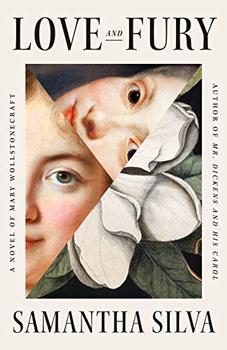Book Club Discussion Questions
In a book club? Subscribe to our Book Club Newsletter and get our best book club books of 2025!
For supplemental discussion material see our Beyond the Book article, The Legacy of Mary Wollstonecraft and our BookBrowse Review of Love and Fury.
Please be aware that this discussion guide will contain spoilers!
- Discuss the novel's title. How do both love and fury shape the lives of Mary Wollstonecraft and Mrs. Blenkinsop? What do those words mean to you?
- Love and Fury alternates between third-person narration from Mrs. Blenkinsop's perspective and first-person narration from Mary's. What is the effect of moving back and forth between these two strands? How do they inform each other?
- Mary's chapters are narrated directly to her daughter. As she says: "I will tell you the story to fill you up and bind you to this wondrous vale, if you stay with us, little bird. Please stay. I will tell you the moments that begin and end me—because we are made of them all, strung like pearls in time, searching always for where the new circle begins its turn, the place of our next becoming. Where the line becomes an arc, and curves." What does she mean? Do you agree with her description of life as a series of moments "strung like pearls in time"?
- When Mary is a child, she describes nature as "my only home on earth, a place to rest, unbound." What role does nature play throughout her life? How do her views evolve as she gets older?
- Mary tells Jane Arden: "I am singular in my thoughts of love and friendship...I must have the first place with you or none." What does Mary's relationship with Jane mean to her? How does it foreshadow future relationships, notably with Fanny Blood and Imlay?
- In one of their last conversations, John Arden tells Mary: "Yet cut open a burl, Miss Wollstonecraft, and instead of straight grain one finds waves and swirls of wood, marbled and feathered, even 'eyes' staring back at us. It's the most prized wood, above everything...Our knots are the strongest part of us. And our burls the place of our greatest beauty, if we but grow up around them, and reach for the sun." What are some of the "knots" that shape Mary's life?
- Mary describes Fanny Blood as the person she loved most in the world, after her daughters. What does Fanny mean to her? Would you describe their relationship as romantic?
- Discuss Mary's philosophy on the education of young women and girls: "Integrity, creativity, self-discipline. If they could learn to value their own minds, not the minds of others, of men,
they might refuse trivialities in favor of depth, and true human purpose, a new society, made by them, reflected in them. That, I believe, is the highest virtue." What does she mean? What is the importance of education over the course of Mary's life?
- Do you sympathize at all with Lady Kingsborough? In what ways does she embody the difficulties women faced in the eighteenth century, despite their wealth and position?
- Mary reflects: "I seek a poetics of change. For women and men. That joins sense with sensibility. But a sensibility governed by reason." Later in the novel, Mrs. Blenkinsop remarks on "the way [Mary]turns feeling into thinking and thinking into feeling." What do sense and sensibility mean in the context of this novel? How are they related to feeling and thinking, in particular?
- Mary tells Fuseli: "I don't want women to have power over men, but power, at last, over themselves." What does power mean to her? Discuss instances in the novel where she has power over her life, and when she doesn't.
- The first words Mary writes in crafting A Vindication of the Rights of Woman, arguably her most famous work, are: "A wild wish has just flown from my heart to my head, and I will not stifle it, though it may excite a horse-laugh. I do earnestly wish to see the distinction of sex confounded in society." What do you think she means by that? How does it shape her approach to life and relationships?
- Mary reflects: "Where Fuseli was the tinder and spark, Imlay was my raging fire." How do her relationships with these two men influence her views on love, sex, and marriage? How are they similar and different? How does Mary's marriage to Godwin model a different kind of partnership?
- Mrs. Blenkinsop describes everything she witnesses between Mary's childbirth and death as "all this—sad and glorious beautiful." What do you think she means? Is Mrs. Blenkinsop changed by her experience with Mary? If so, how?
- In the last line of the novel, Mary tells her daughter, "Sorrow, my sweet girl, will bring you to your knees, time and again, but so will beauty, so too love, enough to rise again, to try again, to live as all beings wish to live: free." What does freedom mean to Mary, and how does her understanding evolve over the course of her life? Do you think Mary herself "lives freely"?
Unless otherwise stated, this discussion guide is reprinted with the permission of Flatiron Books.
Any page references refer to a USA edition of the book, usually the trade paperback version, and may vary in other editions.
